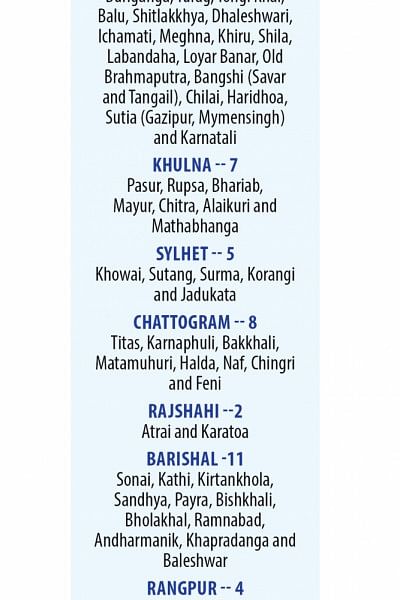
Around two decades ago, river pollution was confined to mega cities like Dhaka and Chattogram. It has now spread to every town in the country.
According to a new study, at least 56 rivers flowing through different parts of the country are suffering from extreme pollution during the lean period — when natural flows of rivers are at their lowest.
Conducting a year-long physical survey and testing the water from 56 selected rivers in Dhaka, Khulna, Sylhet, Rajshahi, Rangpur, Barishal and Chattogram divisions, the Rivers and Delta Research Centre (RDRC) has found that each one of them is polluted.
The RDRC, a non-government organisation working for rivers, carried out the survey from February 2022 to February this year. It selected the rivers based on various newspaper reports.
The organisation tested the levels pH, dissolved oxygen (DO), chemical oxygen demand (COD) and biological oxygen demand (BOD) of each river water sample at a Gazipur laboratory.
The COD is the amount of oxygen, the standard of which is 200mg per litre, required to chemically oxidise organic materials, while the BOD represents the amount of oxygen, the standard of which is 50mg, consumed by bacteria and other microorganisms. The pH is the quantitative measure of the water’s acidity, which should ideally range between 6-9.
Mohammad Azaz, chairman of RDRC, said, “We generally tend to think the Buriganga is the most polluted river in the country. But we have found some others in Dhaka division, which are in a worse state.
“What is alarming is that plastic and polythene pollution was prevalent in all 56 rivers that we surveyed.”
Of the 56 rivers, 19 are located in Dhaka division, and all of them are severely polluted.
Apart from those, seven rivers are in Khulna division, five in Sylhet, eight in Chattogram, two in Rajshahi, 11 in Barishal and four in Rangpur.

He added that river pollution has been seriously impacting the local communities, especially people living near the water bodies.
According to the study, some rivers outside Dhaka, where there are no big factories, the DO levels are within the standard (4.5-8mg per litre) but the pH, COD or BOD levels are much too high, Azaz said.
The dissolved oxygen level in 25 rivers out of 56 is below 5mg per litre during the lean period, making the water unlivable for fish or other aquatic creatures, experts said.
The water of the Buriganga, Tongi canal, Shitalakkhya, Dhaleshwari in Dhaka and Narayanganj; Labandaha in Gazipur; Haridhowa in Narshingdi; Sutang in Sylhet, and Kirtankhola in Barisal had DO levels lower than 1mg per litre, while it was below 2mg in Dhaka division’s Balu and Turag rivers.
According to the survey report, five rivers in Barishal division, including the Bhola canal, Ramnabad, Andharmanik, Khapra Bhanga and Baleshwar, are affected by severe plastic pollution.
At least 16 of the 56 rivers in question are polluted with household and plastic wastes.
Meanwhile, 35 rivers were polluted by plastic, industrial waste and household wastes from municipality authorities.
Apart from only three rivers in Rangpur, all the others were victim to industrial pollution.
Earlier in 2016, a Department of Environment report stated that at least 29 rivers were severely polluted.
Professor Mujibur Rahman, a civil engineering faculty of BUET who works on the pollution in the capital, said river pollution is now affecting almost every town in Bangladesh.
“If there is a river by the town, the industries are discharging the waste into it. If not them, then municipality authorities are polluting the rivers.
“Stopping river pollution doesn’t seem to be a priority for the government. Otherwise, it would strictly enforce rules in this regard.”
He added, “Even considering the economic losses, the government should bring down the river pollution.”
News link: River pollution: It’s now all over the country | The Daily Star
